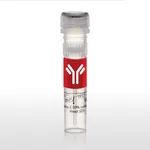Thermo Fisher Scientific Human TRANCE (RANKL) Recombinant Protein
다른 상품 둘러보기
Applications
Tested Dilution
Publications
Western Blot (WB)
Assay-dependent
Immunohistochemistry (IHC)
Assay-dependent
ELISA (ELISA)
Assay-dependent
Functional Assay (Functional)
Assay-dependent
Control (Ctrl)
Assay-dependent
Product Specifications
Species
Human
Expression System
E. coli
Amino acid sequence
Human TRANCE recombinant protein contains 176 amino acids
Molecular weight
20 kDa
Class
Recombinant
Type
Protein
Purity
≥98% by SDS-PAGE and HPLC
Endotoxin concentration
<0.1 ng/µg
Activity
Determined by the dose-dependent ability to induce reporter gene in HT-29 NF-κB Luc reporter cells.
Conjugate
Unconjugated Unconjugated Unconjugated
Form
Lyophilized
Purification
purified
Storage buffer
5mM sodium phosphate, pH 7.6, with 75mM NaCl
Contains
no preservative
Storage conditions
-20°C
Shipping conditions
Wet ice (domestic); Wet or Dry ice (international)
Product Specific Information
Reconstitution: We recommend that this vial be briefly centrifuged prior to opening to bring the contents to the bottom. Reconstitute sRANKL in water to a concentration of 0.1-1.0 mg/mL. Do not vortex. This solution can be stored at 2°C to 8°C for up to 1 week. For extended storage, it is recommended to further dilute in a buffer containing a carrier protein, such as 0.1% BSA and store in working aliquots at -80°C to -20°C.
Storage: The lyophilized protein is stable at room temperature for 1 month, but should be kept at -20°C for long term storage. Working aliquots stored with a carrier protein are stable for at least 3 months at -80°C to -20°C. Avoid repeated freeze/thaw cycles.
Target Information
This gene encodes a member of the tumor necrosis factor (TNF) cytokine family which is a ligand for osteoprotegerin and functions as a key factor for osteoclast differentiation and activation. This protein was shown to be a dentritic cell survival factor and is involved in the regulation of T cell-dependent immune response. T cell activation was reported to induce expression of this gene and lead to an increase of osteoclastogenesis and bone loss. This protein was shown to activate antiapoptotic kinase AKT/PKB through a signaling complex involving SRC kinase and tumor necrosis factor receptor-associated factor (TRAF) 6, which indicated this protein may have a role in the regulation of cell apoptosis. Targeted disruption of the related gene in mice led to severe osteopetrosis and a lack of osteoclasts. The deficient mice exhibited defects in early differentiation of T and B lymphocytes, and failed to form lobulo-alveolar mammary structures during pregnancy. Two alternatively spliced transcript variants have been found.
For Research Use Only. Not for use in diagnostic procedures. Not for resale without express authorization.
배송/결제/교환/반품 안내
배송 정보
| 기본 배송비 |
| 교환/반품 배송비 |
|
|---|---|---|---|
| 착불 배송비 |
| ||
| 교환/반품 배송비 |
| ||
결제 및 환불 안내
| 결제수단 |
|
|---|---|
| 취소 |
|
| 반품 |
|
| 환급 |
|
교환 및 반품 접수
| 교환 및 반품 접수 기한 |
|
|---|---|
| 교환 및 반품 접수가 가능한 경우 |
|
| 교환 및 반품 접수가 불가능한 경우 |
|
교환 및 반품 신청
| 교환 절차 |
|
|---|---|
| 반품 절차 |
|




